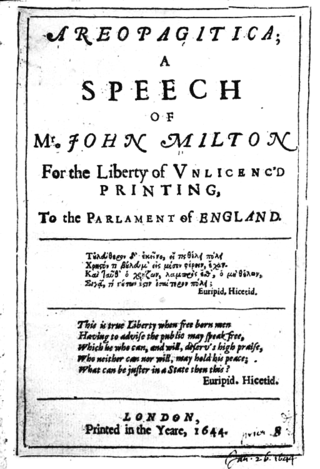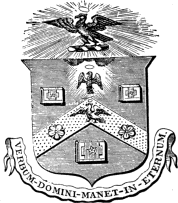
John Milton was an English poet, polemicist, and civil servant. His 1667 epic poem Paradise Lost, written in blank verse and including twelve books, was written in a time of immense religious flux and political upheaval. It addressed the fall of man, including the temptation of Adam and Eve by the fallen angel Satan and God's expulsion of them from the Garden of Eden. Paradise Lost elevated Milton's reputation as one of history's greatest poets. He also served as a civil servant for the Commonwealth of England under its Council of State and later under Oliver Cromwell.

The Statute of Anne, also known as the Copyright Act 1709 or the Copyright Act 1710, was an act of the Parliament of Great Britain passed in 1710, which was the first statute to provide for copyright regulated by the government and courts, rather than by private parties.
The Master of the Revels was the holder of a position within the English, and later the British, royal household, heading the "Revels Office" or "Office of the Revels". The Master of the Revels was an executive officer under the Lord Chamberlain. Originally he was responsible for overseeing royal festivities, known as revels, and he later also became responsible for stage censorship, until this function was transferred to the Lord Chamberlain in 1624. However, Henry Herbert, the deputy Master of the Revels and later the Master, continued to perform the function on behalf of the Lord Chamberlain until the English Civil War in 1642, when stage plays were prohibited. The office continued almost until the end of the 18th century, although with rather reduced status.

John Selden was an English jurist, a scholar of England's ancient laws and constitution and scholar of Jewish law. He was known as a polymath; John Milton hailed Selden in 1644 as "the chief of learned men reputed in this land".

Areopagitica; A speech of Mr. John Milton for the Liberty of Unlicenc'd Printing, to the Parlament of England is a 1644 prose polemic by the English poet, scholar, and polemical author John Milton opposing licensing. Areopagitica is among history's most influential and impassioned philosophical defences of the principle of a right to freedom of speech and expression. Many of its expressed principles have formed the basis for modern justifications of that right.

The Lord Chamberlain of the Household is the most senior officer of the Royal Household of the United Kingdom, supervising the departments which support and provide advice to the Sovereign of the United Kingdom while also acting as the main channel of communication between the Sovereign and the House of Lords. The office organises all ceremonial activity such as garden parties, state visits, royal weddings, and the State Opening of Parliament. They also oversee the Royal Mews and Royal Travel, as well as the ceremony around the awarding of honours.

The history of copyright starts with early privileges and monopolies granted to printers of books. The British Statute of Anne 1710, full title "An Act for the Encouragement of Learning, by vesting the Copies of Printed Books in the Authors or purchasers of such Copies, during the Times therein mentioned", was the first copyright statute. Initially copyright law only applied to the copying of books. Over time other uses such as translations and derivative works were made subject to copyright and copyright now covers a wide range of works, including maps, performances, paintings, photographs, sound recordings, motion pictures and computer programs.

The Worshipful Company of Stationers and Newspaper Makers, usually known as the Stationers' Company, is one of the livery companies of the City of London. The Stationers' Company was formed in 1403; it received a Royal Charter in 1557. It held a monopoly over the publishing industry and was officially responsible for setting and enforcing regulations until the enactment of the Statute of Anne, also known as the Copyright Act of 1710. Once the company received its charter, "the company's role was to regulate and discipline the industry, define proper conduct and maintain its own corporate privileges."
This is a timeline of events leading up to, culminating in, and resulting from the English Civil Wars.

Sir Roger L'Estrange was an English pamphleteer, author, courtier and press censor. Throughout his life L'Estrange was frequently mired in controversy and acted as a staunch ideological defender of King Charles II's regime during the Restoration era. His works played a key role in the emergence of a distinct 'Tory' bloc during the Exclusion Crisis of 1679–81. Perhaps his best known polemical pamphlet was An Account of the Growth of Knavery, which ruthlessly attacked the parliamentary opposition to Charles II and his successor James, Duke of York, placing them as fanatics who misused contemporary popular anti-Catholic sentiment to attack the Restoration court and the existing social order in order to pursue their own political ends. Following the Exclusion Crisis and the failure of the nascent Whig faction to disinherit James, Duke of York in favour of Charles II's illegitimate son James, 1st Duke of Monmouth, L'Estrange used his newspaper The Observator to harangue his opponents and act as a voice for a popular provincial Toryism during the 'Tory Reaction' of 1681–85. Despite serving as an MP from 1685 to 1689 his stock fell under James II's reign as his staunch hostility to religious nonconformism conflicted with James's goals of religious tolerance for both Catholics and Nonconformists. The Glorious Revolution of 1688 and the collapse of the Restoration political order heralded the end of L'Estrange's career in public life, although his greatest translation work, that of Aesop's Fables, saw publication in 1692.
Charles Blount was an English deist and philosopher who published several anonymous essays critical of the existing English order.

Robert Greville, 2nd Baron Brooke was a radical Puritan activist and leading member of the opposition to Charles I of England prior to the outbreak of the First English Civil War in August 1642. Appointed Parliamentarian commander in Staffordshire and Warwickshire, he was killed by a Royalist sniper at Lichfield on 2 March 1643.
Press laws are the laws concerning the licensing of books and the liberty of expression in all products of the printing-press, especially newspapers. The liberty of the press has always been regarded by political writers as of supreme importance. Give me liberty to know, to utter, and to argue freely according to conscience, above all other liberties, says Milton in the Areopagitica.

The Licensing of the Press Act 1662 was an Act of the Parliament of England with the long title An Act for preventing the frequent Abuses in printing seditious treasonable and unlicensed Books and Pamphlets and for regulating of Printing and Printing Presses. Having expired in 1695, it was officially repealed by the Statute Law Revision Act 1863, which repealed a large set of superseded acts.
Milton's divorce tracts refer to the four interlinked polemical pamphlets—The Doctrine and Discipline of Divorce, The Judgment of Martin Bucer, Tetrachordon, and Colasterion—written by John Milton from 1643 to 1645. They argue for the legitimacy of divorce on grounds of spousal incompatibility. Arguing for divorce at all, let alone a version of no-fault divorce, was extremely controversial and religious figures sought to ban his tracts. Although the tracts were met with nothing but hostility and he later rued publishing them in English at all, they are important for analysing the relationship between Adam and Eve in his epic Paradise Lost. Spanning three years characterised by turbulent changes in the English printing business, they also provide an important context for the publication of Areopagitica, Milton's most famous work of prose.
Henry Robinson was an English merchant and writer. He is best known for a work on religious toleration, Liberty of Conscience from 1644.
Politics were an important part of John Milton's life. Milton enjoyed little wide-scale early success, either in prose or poetry, until the production of his later, controversial political works starting with The Tenure of Kings and Magistrates and Eikonoklastes.

Freedom of speech is a principle that supports the freedom of an individual or a community to articulate their opinions and ideas without fear of retaliation, censorship, or legal sanction. The right to freedom of expression has been recognised as a human right in the Universal Declaration of Human Rights and international human rights law by the United Nations. Many countries have constitutional law that protects free speech. Terms like free speech, freedom of speech, and freedom of expression are used interchangeably in political discourse. However, in a legal sense, the freedom of expression includes any activity of seeking, receiving, and imparting information or ideas, regardless of the medium used.
Gregory Dexter was a renowned printer of important and controversial books and pamphlets in London. In New England, he assumed various roles including serving as a consultant to printers, a Baptist minister, an owner of a limestone quarry, and a political figure elected as president of the combined towns of Providence and Warwick in colonial Rhode Island. He is best known as the printer of Roger Williams's book A Key into the Language of America in 1643, the first English translation of a Native American language.
In the Philippines, censorship involves the control of certain information.











